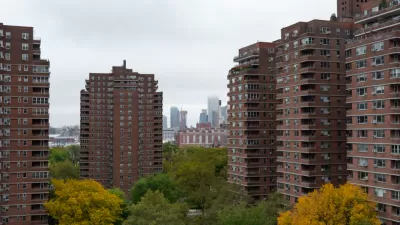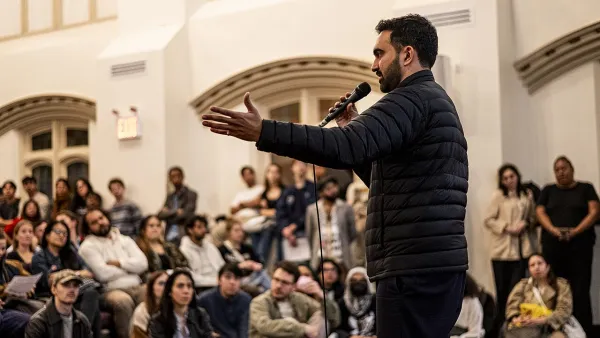Non-profit developers are joining forces to increase their buying power in the pricey New York housing market.

Affordable housing groups in New York are pooling properties under the control of a new member organization, JOE NYC, to help them "get an edge" in the real estate market, Oscar Perry Abello reports for Next City.
Community-based non-profit developers have had a heavy hand in creating and preserving affordable housing in New York since the 1970s, the article notes: Over the past 25 years, they've helped procure 120,000 affordable units in the city.
Today, these developers are faced with an increasingly expensive real estate market and the potential for currently affordable properties to "fall out" of the Low-income Housing Tax Credit incentive program. Joining forces under the JOE NYC umbrella could help them preserve and add to their existing portfolios as well as undertake new construction.
By pooling properties in JOE NYC, the nonprofits can start to combine their buildings in that way to get the bigger loan together, instead of trying for a bunch of smaller loans they might not be able to afford.
On the new construction front, JOE members hope they can partner with community-based nonprofit developers in going after requests for proposals from city agencies for new affordable housing developments — and beat out for-profit developers.
JOE currently has ten member organizations, and expects to build a portfolio of at least 3,000 affordable units over the next year.
FULL STORY: Nonprofits Join Up to Increase Affordable Housing Heft

Planetizen Federal Action Tracker
A weekly monitor of how Trump’s orders and actions are impacting planners and planning in America.

Maui's Vacation Rental Debate Turns Ugly
Verbal attacks, misinformation campaigns and fistfights plague a high-stakes debate to convert thousands of vacation rentals into long-term housing.

San Francisco Suspends Traffic Calming Amidst Record Deaths
Citing “a challenging fiscal landscape,” the city will cease the program on the heels of 42 traffic deaths, including 24 pedestrians.

Amtrak Rolls Out New Orleans to Alabama “Mardi Gras” Train
The new service will operate morning and evening departures between Mobile and New Orleans.

The Subversive Car-Free Guide to Trump's Great American Road Trip
Car-free ways to access Chicagoland’s best tourist attractions.

San Antonio and Austin are Fusing Into one Massive Megaregion
The region spanning the two central Texas cities is growing fast, posing challenges for local infrastructure and water supplies.
Urban Design for Planners 1: Software Tools
This six-course series explores essential urban design concepts using open source software and equips planners with the tools they need to participate fully in the urban design process.
Planning for Universal Design
Learn the tools for implementing Universal Design in planning regulations.
Heyer Gruel & Associates PA
JM Goldson LLC
Custer County Colorado
City of Camden Redevelopment Agency
City of Astoria
Transportation Research & Education Center (TREC) at Portland State University
Jefferson Parish Government
Camden Redevelopment Agency
City of Claremont





























